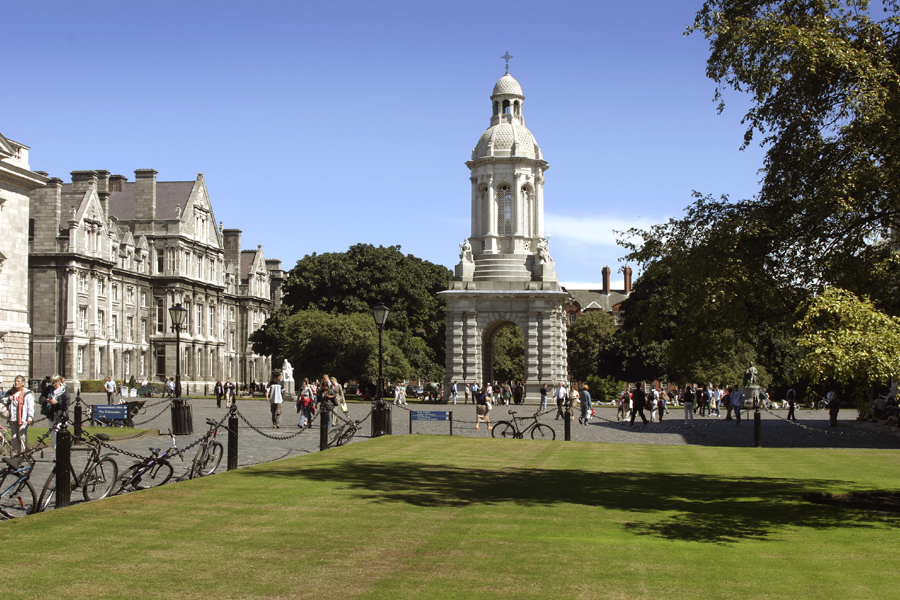A new report into the efficiency of Irish universities and Institutes of Technology has shown Trinity to be “at or near the frontier in all areas”, according to an academic involved in the study.
Professor Brian Lucey said that Trinity is “pretty much a class leader” in an Irish context, on the back of the study which shows it ahead of the national average when it comes to efficiency in teaching, research, and knowledge transfer activities like patenting and commercialisation.
The report, carried out by three academics from the Trinity Business School, analysed the efficiency of Irish Higher Education Institutions (HEIs) relative to one another with regard to the three areas of activity.
Professor Lucey, who authored the study with Dr Charles Larkin and Dr Qiantao Zhang, said that the research was important as it “provides a look into the three domains that universities are dealing with nowadays”.
The work was carried out as part of the ongoing TIONCHAR project, which looks at the economic impact of Irish education more broadly.
The report also found that an institution having a higher share of female academic staff was beneficial to efficiency.
A demonstrable hit to efficiency in 2010-11 is evident from the report as funding cuts took hold – though the year was an exception in the context of an ongoing trend of increasing efficiency.
Professor Lucey said that similar research has been carried out on institutions elsewhere, but that no international comparisons could correctly be drawn from this study, which only looked at Irish institutions to assess who was “best in their own field”. “We can’t say anything from this study” about the comparative efficiency of Irish as opposed to UK, US or European institutions, although similar research has indeed been carried out elsewhere. He added that on the metrics that are comparable with the UK, “we come out pretty well”.
The report also looks at the correlation between the different efficiency estimates. One of the main conclusions being drawn from the research is that it is extremely hard for an institution to improve its efficiency in all three domains, with two being the best that can be hoped for. “Put differently, an institution cannot improve its efficiency in research or knowledge transfer by improving its efficiency in teaching, as teaching seems to be irrelevant to the other two types of activities”, the report states. Professor Lucey said that though the efficiency scores are “to some extent independent of the funding issue”, there are lessons to be inferred for education policy more generally. Research suggests that “trying to push institutions to be best in class at all aspects of the mission will be difficult, that you might actually be better off allowing for specialisation”.
The study used a number of inputs and outputs to assess the overall efficiency of the country’s universities and ITs between the 2009-10 and 2013-14 academic years. The results sets published accounted for both ‘unadjusted’ and ‘quality-adjusted’ inputs and outputs respectively. “In particular, the quality-adjusted measures take into account the reliance of an institution on state funding and the strength of research capacity”, which may impact on the efficiency score.
For example, when looking at the field of teaching, inputs included the institution’s total income, academic and non-academic staff and fixed assets, while outputs in the different activity areas included the numbers of different types of graduates, the income derived from research and the number of patents and spin-out firms generated.
In both the ‘unadjusted’ and ‘quality-adjusted’ models, Trinity scored above the national average on all counts. Its scores for teaching, for example, were 0.95 and 0.97 out of a potential 1.00 respectively, compared with national averages of 0.88 and 0.93. In relation to research, Trinity had scores of 0.75 and 0.86 in the two models compared to averages of 0.74 and 0.86 nationwide, while knowledge transfer showed Trinity with scores of 0.83 and 0.95, as opposed to national scores of 0.72 and 0.80.
Professor Lucey stressed that there was little hope of fully understanding the process that went into arriving at these numbers “unless you were familiar with regression analysis” used in the study, but stated that in plain terms, what is being looked at is “how you transform inputs into outputs”.
One of the more startling takeaways from the study is the large hit in efficiency seen in the 2010-11 academic year, as the first rounds of funding cuts following on from the financial crisis took hold. In the study’s ‘unadjusted’ model, the efficiency of teaching fell nationwide from 0.90 to 0.81, research fell from 0.72 to 0.54, and knowledge transfer from 0.76 to 0.49, although the ‘quality-adjusted’ model showed less steep losses.
Interestingly, the years following this showed a recovery on all efficiency estimates, though Professor Lucey cautioned against seeing this as evidence that cuts are not having an impact. “This is all relative”, he said, adding that if all institutions “fall into a hole”, the question becomes “who’s on top of the hole”. Since then, he said, people have been “working their way out of the hole… The system is still very stressed, it’s just that within that, the degree of relative efficiency” appears to have improved.







